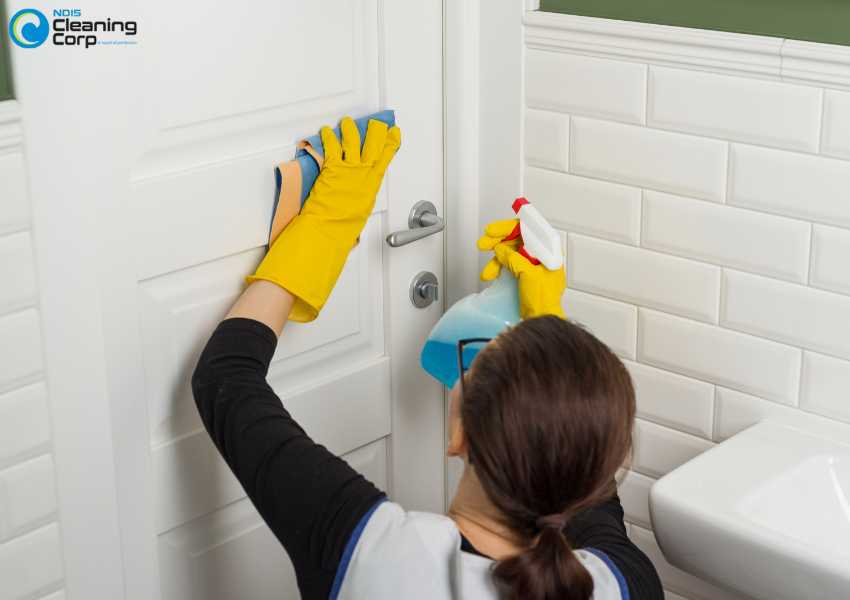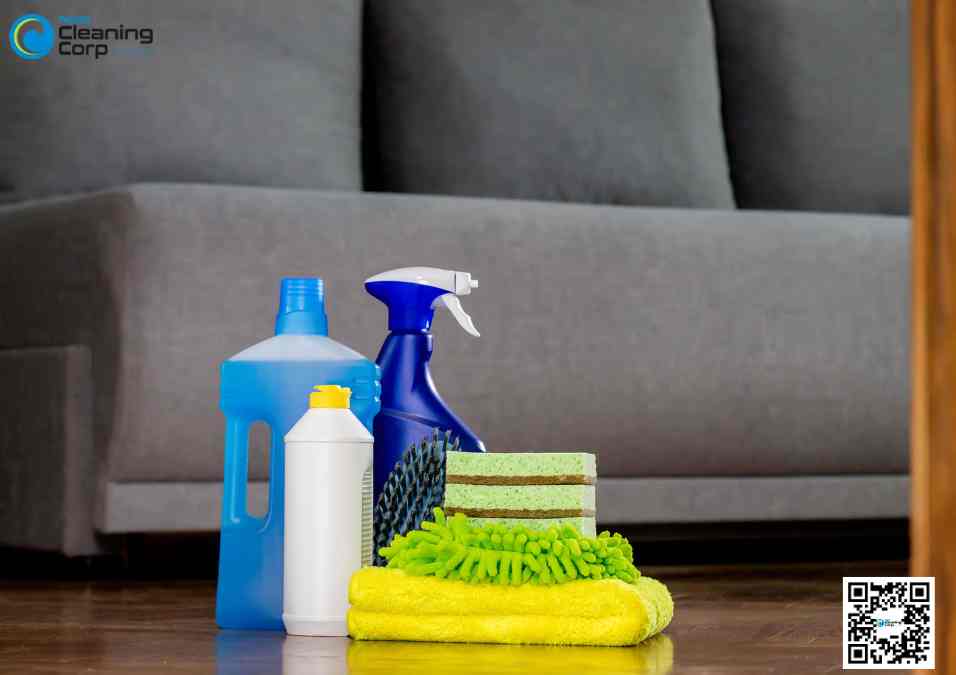Does the NDIS Fund Cleaning Services?
Yes. The NDIS does fund cleaning services — but it...
For NDIS participants with limited mobility, a clean home isn’t just about aesthetics; it’s essential for health, safety, and independence. Many people don’t realize how deeply cleanliness can impact someone’s quality of life, especially for those dealing with mobility challenges. Simple tasks like dusting, organizing, and keeping a clean bathroom can seem minor but make a massive difference for anyone with mobility limitations.
When a home is free from dust, clutter, and obstacles, it can help prevent illness and reduce the risk of falls, which are among the top concerns for NDIS participants. A clean and organized environment supports daily living activities and provides a sense of control, dignity, and comfort. The National Disability Insurance Scheme (NDIS) actively supports participants in maintaining their health and well-being. For many, NDIS funding includes access to regular cleaning services or equipment that makes managing home hygiene easier.
A clean home does more than just reduce health risks. It makes daily tasks smoother, more accessible, and empowers individuals to move more freely and independently within their own space. For NDIS participants with mobility restrictions, home cleanliness is an often overlooked but crucial part of their health and independence journey.

Maintaining a clean home can make a noticeable difference in a participant’s health. A clean environment helps reduce allergens, dust, and pathogens that can irritate or even compromise an immune system—something that can be especially problematic for those with existing health conditions. For instance, dust and mold in the home can easily trigger respiratory issues, which can then snowball into more severe health problems. Regular cleaning and dusting ensure that indoor air quality stays high, supporting respiratory health and overall well-being.
Here’s a real-life example: We had a participant who struggled with frequent respiratory infections due to dust buildup in her apartment. She didn’t realize just how much the dusty air was affecting her health until she started receiving regular cleaning support through NDIS. With regular cleaning, her symptoms reduced significantly, and she found herself making fewer trips to the doctor.
Safety is one of the top reasons why cleanliness matters so much for NDIS participants with limited mobility. Imagine trying to navigate a home where there’s clutter on the floor or spills left unaddressed. For someone who relies on mobility aids like a walker or wheelchair, cluttered spaces are like obstacle courses that can lead to trips, slips, and falls.
Keeping pathways clear and surfaces non-slip is essential. Something as simple as clearing away piles of magazines, shoes left in the hallway, or ensuring that rugs stay in place can prevent accidents. For example, we had a client who kept tripping over clutter near her bedroom doorway. Once we helped her reorganize and establish clear pathways, her risk of falling decreased significantly, making her feel more secure and confident in her own home.
Cleanliness doesn’t just impact physical health; it also fosters a sense of independence. When a home is organized, with everything in its proper place, NDIS participants can more easily locate what they need and move around comfortably. This independence is invaluable because it allows individuals to handle more daily activities on their own, giving them control over their space and routine.
Accessible storage solutions can also make a world of difference. We once worked with a participant who struggled to reach cleaning supplies stored in high cabinets. By reorganizing her home and using lower shelves, she could clean up minor spills or messes without help, enhancing her comfort and confidence at home. Being able to manage these small tasks brought a huge sense of empowerment.
Choosing the right tools can make cleaning easier and less tiring for someone with limited mobility. Lightweight vacuums, for example, can be easier to maneuver, and long-handled dusters help reach spots that may otherwise require bending or stretching. Additionally, products like microfiber cloths, which capture dust without much effort, are incredibly helpful.
For health safety, non-toxic cleaning products are ideal, especially for those with respiratory sensitivities. Many conventional cleaners contain strong chemicals that can irritate the lungs, so using natural, eco-friendly options can help reduce exposure to harmful fumes while keeping the home fresh.
Organizing is half the battle. Decluttering and using reachable storage options can make it easier to keep the home in order without excessive bending, reaching, or lifting. Small storage solutions, like baskets or wall hooks at an accessible height, are excellent for keeping frequently used items within easy reach.
When everything has its designated place, it reduces the physical effort needed to find or put things away. For example, organizing cleaning supplies on a low shelf in the bathroom or kitchen can make it easier to access without unnecessary movement. Keeping clutter off the floor is also essential for clear paths, helping to prevent accidents and making cleaning less overwhelming.
Through NDIS, participants can apply for in-home cleaning support, which is often a huge relief for those who struggle with maintaining a clean home independently. NDIS cleaning services generally include basic cleaning tasks, like dusting, vacuuming, and organizing.
The application process for cleaning support is straightforward, with eligibility based on individual needs. Participants can discuss their needs during the planning meeting, and once approved, they can work with a registered NDIS provider to arrange cleaning support. Having access to these services not only reduces the physical load but also allows participants to enjoy a consistently clean and safe home environment.
Living in a clean environment can boost mood, reduce stress, and improve mental clarity. When the home is tidy and free of mess, it creates a sense of calm and order, which can be very grounding. For many NDIS participants, mental well-being is intertwined with their physical space, and a clean home can help reduce anxiety and promote relaxation.
Imagine how refreshing it feels to walk into a room that’s spotless and well organized. Many participants tell us they feel more in control and happier in a clean, organized home. In fact, we’ve heard from clients that they sleep better and feel more energized when they wake up in a clean, clutter-free space.
A clean, organized space also builds confidence to invite friends, family, and support staff over. For NDIS participants, this can mean feeling comfortable hosting a loved one for tea or sharing a meal with friends, which can strengthen social connections and provide emotional support.
We had a participant who felt embarrassed about inviting people over due to the state of her home. With regular cleaning support, her space became more welcoming, and she felt confident enough to have friends over again. She shared with us how her social life improved and how these connections positively impacted her mental health.
For many NDIS participants, physical limitations and fatigue make cleaning a difficult task. I’ve met clients who truly want to keep their home tidy but find the physical toll overwhelming. Imagine trying to vacuum when just standing is a struggle, or dusting high shelves when reaching up is painful or even dangerous. For those with limited mobility, even simple tasks like wiping down counters or bending to pick things up can lead to exhaustion. Fatigue is a major factor that isn’t always visible but impacts daily routines.
One way to work around these limitations is by using ergonomic cleaning tools designed to make cleaning more manageable. Long-handled dusters or lightweight cordless vacuums are a game-changer for many of our clients. These tools reduce the need for bending or reaching, making it possible to clean without overexerting oneself. I had one participant who invested in a robot vacuum to keep her floors free from dust and dirt, and it was a huge relief for her. She shared with me that just having that one task handled gave her back a lot of energy and confidence to keep up with other parts of her home.
Another big challenge for NDIS participants is financial limitations, which can make it hard to access regular cleaning services or purchase adaptive cleaning tools. Not everyone can afford to buy specialized equipment or hire someone to help. This can feel discouraging because we all deserve a clean and comfortable home, but costs sometimes make it difficult.
Thankfully, there are affordable options and resources that can help. Many community programs offer discounted or even free cleaning services to those in need. Through NDIS, there are often options for financial support to assist with cleaning or the purchase of necessary tools. I always encourage participants to check with their NDIS planner or local council to see if any additional funding or programs are available. Sometimes just reaching out can uncover resources participants didn’t know they had.
FAQs
Q1: How can I access NDIS support for cleaning services?
Accessing NDIS cleaning support involves a few steps. First, you’ll need to discuss this need during your planning meeting with your NDIS planner. They’ll assess your situation and determine whether cleaning support aligns with your goals and needs. If approved, you can then arrange services with an NDIS-registered provider, who will help set up a schedule that works for you.
Q2: What cleaning products are safest for people with respiratory issues?
A: For anyone with respiratory issues, non-toxic and hypoallergenic cleaning products are the safest choice. Look for brands that are free from harsh chemicals, fragrances, and allergens. Products with natural ingredients like vinegar, baking soda, and plant-based cleaners are often gentle on the lungs and still effective at keeping things clean.
Q3: Are there any government programs that support home modifications for cleanliness and safety?
A: Yes, there are several programs that provide funding for home modifications to enhance safety and cleanliness for NDIS participants. The NDIS itself offers funding for modifications as part of your plan if it directly relates to your goals and well-being. Additionally, some local councils and organizations have programs that support home modifications for accessibility and safety, so it’s worth checking with them for more details.
Conclusion
Maintaining a clean home for NDIS participants with limited mobility isn’t just about appearances; it’s about safety, health, and a better quality of life. Living in a tidy space helps reduce health risks, prevent accidents, and support independence. Whether it’s keeping dust under control for respiratory health or clearing pathways to avoid falls, a clean home is an essential part of creating a supportive environment for daily living.
I encourage everyone to consider the unique needs of individuals with limited mobility and explore the resources available through NDIS. A clean, safe, and accessible home can make a world of difference. If you or someone you know is an NDIS participant, consider the importance of maintaining a supportive home environment—it truly impacts every aspect of life.

Yes. The NDIS does fund cleaning services — but it...

Alright, let’s get straight into it. These are the questions...

NDIS cleaning services are specifically designed to cater to the...

The role of professional cleaning in maintaining a safe and...

Studies consistently show that living in a clutter-free, organized space...